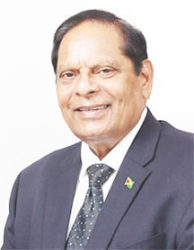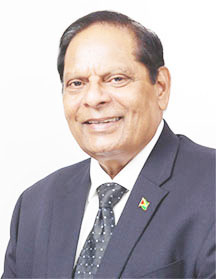Prime Minister Moses Nagamootoo yesterday issued a defence for the recently passed amendments to the broadcasting legislation, while saying that they are urgently needed in the public’s interest and cannot be delayed.
In a five-page statement that was released yesterday afternoon, Nagamootoo charged that there has been both a “gross misunderstanding” and in some cases “deliberate misrepresentation” of the amendments, and he argued that in most cases they “give clarity” and “add certainty” to sections of the Broadcasting Act of 2011.
The statement came in wake of several local and international calls for President David Granger to return the Broadcasting (Amendment) Bill 2017, which was passed just over a week ago, to the National Assembly for consultations with stakeholders over some of its contentious provisions. These provisions include the requirement that all broadcasters reapply for licensing within 30 days of the amendments coming into force as well as the requirement that all stations air “public service programmes” for up to 60 minutes a day, free of cost, between 6 am and 10 pm.
“The assent… to the Broad-casting (Amendment) Bill 2017 cannot be delayed by vested and parochial political interests, and by misconceived or misinformed arguments. The amendments are required, with some urgency, in the public interest,” Nagamootoo, however, declared in his statement, signaling that the administration has been unmoved by the concerns and that the president will assent to the bill.

Last week, the Private Sector Commission (PSC) and the Georgetown Chamber of Commerce and Industry (GCCI) called for Granger to return to bill to the House. The PSC, in a statement, said that the government missed a golden opportunity to revisit and revise the 2011 Act, which it said did not receive full and adequate consultation with the licensed broadcast owners and the general public at the time of its enactment. The PSC lamented that instead, the government has used its parliamentary majority to enforce amendments of a bad bill, which bring into question the government’s intention with regard to the amendment’s real purpose.
For its part, the GCCI appealed to the president to refrain from assenting to the bill in its current format, and suggested that it be sent to a select committee and that Nagamootoo hold consultations with industry stakeholders and consider amending the language of the bill.
The Guyana Press Association and two international press freedom bodies, Reporters Without Borders and the International Press Institute, are among the groups that have voice their concerns over the provisions of the bill and urged against the president assenting to it.
‘A practical measure’
Addressing the requirement that all broadcasters reapply for licences, Nagamootoo pointed out that this was also a requirement in 2011 after the Act stipulated that all legitimate broadcasters must submit applications for continuation of broadcasting within 30 days of it coming into effect.
He said the bill re-applies this requirement for submission of applications in keeping with the classes of licences, the zoning for operations and the adjusted fees for the different zones. “This is a practical measure, and logical within the context of the adjusted broadcasting landscape, which was done in full conformity with the existing Broadcasting law,” he contended.
“The Opposition-driven allegations that the amendments violate the Constitution, breach international treaties and conventions, “kill” freedom of the press and take away “proprietary interests” of broadcasters, are totally without merit, and form part of the partisan political propaganda against the need for modern legislative changes in Guyana,” Nagamootoo further said.
The bill says too that broadcasters who fail to apply for licensing or are rejected by the broadcast authority shall immediately halt operations or they would be guilty of an offence, for which they could face a one-year prison term and a fine of $1 million. It says too that “all machinery and equipment used, or which can be used, for broadcasting and owned by or in the possession of the person concerned” is liable to be forfeited.
‘Maximum cap’
Some of the criticism directed against the bill stemmed from the failure by government to consult with broadcasters on the recommended changes. Nagamootoo, who had piloted the bill through the National Assembly, noted that the amendments were recommended by the Guyana National Broadcasting Authority (GNBA) and tabled by him after “statutory consultation” with the National Frequency Management Unit (NFMU), as required by the 2011 Act. “It is apparent that those who have expressed some sort of opposition to the amendments did not examine carefully the provisions of the 2011 Act, which the amendments seek to give effect, as authorised by the said Act. In most cases, the amendments give clarity to certain Sections and also, add certainty to them,” he said, before later citing the definition of “public service broadcasting” introduced by the amendment. He noted that the Act had no definition for “public service broadcasting,” although it makes provision for broadcasters to provide “certain percentage” of time for such broadcasting.
The bill defines such broadcasts as “programmes produced for the purpose of informing and educating the public, and promoting policies and activities of the Government that benefit the public as a whole.”
Nagamootoo also highlighted that Act already vests the GNBA with powers to require licensees to carry information on any programmes issued by the Civil Defence Commission (CDC), the Guyana Police Force, the Guyana Fire Service and/or health services, and certain other programmes as public information deemed appropriate and necessary in terms of national security, emergency and disaster as a public service at no cost. He said it also vests the entity with powers to require licensees to carry “a certain percentage of public service broadcast or development support broadcast” as a public service at no cost. He said “development support broadcast” has long been recognised as relating to government development programmes.
Against this background, he argued that the amendment introduced in the bill seeks to place a “maximum cap” on the “certain percentage,” which in the original law excludes information issued by the CDC and the Guyana Police Force “and therefore, could have been interpreted as requiring additional free broadcast time to the “certain percentage” to which I have already alluded.” He said that with the amendment, that “certain percentage” would include notices of the CDC and the police and limits it to between one minute and sixty minutes daily.
Fees reduced
Nagamootoo also drew attention to the fact that under a Schedule of the existing 2011 Act, all operators were required to pay a flat fee of $2.5 million for a broadcasting licence, whether they had nationwide reach or were confined to a specified and limited location. He blamed the imposition of the fee by the former PPP/C government for the defaulting by most licensees, while saying that some voluntarily became unlicensed since 2012. “Reports indicate that broadcasters owe an estimated $125 million to the GNBA; and only eight (8) of them are in conformity with licensing requirements under law,” he added.
The bill, Nagamootoo said, relieves operators of the heavy fees, except for those attached to a licence to operate radio in the primary (populated) zone. “The new fee for television in the primary zone is slashed to $1,200,000. The licence fees for secondary and tertiary zones are $600,000 and $300,000 respectively. These fees are also applicable to cable. A community radio licence fee is only $150,000,” he said.
The bill would also provide for the classification of all broadcasting operations into “commercial,” “non-commercial” or “community” services, establish broadcasting zones across the country and prohibit the broadcasting of hate speech, racial incitement or terror threats.






